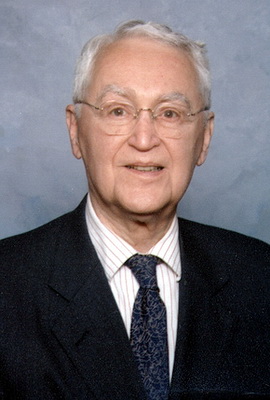
Blackwell Companions to Religion
If we exclude those parts of the world where the Bible was entirely unknown before the advent of Christian missionaries, there are few aspects of culture, ancient, mediaeval and modern, European and non-European, religious and secular, that have not interacted in some way with the Bible. Outside the United Nations building in New York the representatives of at least 191 countries are daily confronted by a bronze statue, 3 metres high, entitled ‘Let us beat our swords into ploughshares’ (cf. Isa. 2:4; Mic. 4:3). According to the latest statistics provided by the United Bible Societies, there are 2,377 languages in which the Bible or parts of it can be read, while another, probably rather less reliable, calculation sets at more than six billion the number of copies of ‘the world’s best-seller’ sold since the invention of printing. The title of this Companion reflects the scale of the subject and sets no boundaries on the areas to be explored, chronological, geographical or thematic. The only limits are arbitrary and practical, namely the size of the volume and its date of publication. As the authors faced with the challenge of contributing to it have frequently pointed out over the past few years, they could not possibly give adequate coverage to every aspect of their topic and have had to be selective. The same is true of the editor. There are many topics that would have been relevant and interesting and which some readers will be disappointed to find missing. What no-one can say, however, is that this project was too narrowly defined, or that the vast range of material covered is not broadly representative of the extraordinary phenomenon implied by the title.
The word ‘Bible’ in the title is itself comprehensive and includes both Jewish and Muslim definitions, although it must be said that, apart from the two chapters specifically devoted to Judaism and Islam, the authors are working by and large with the Christian Bible in the sense that the texts discussed are in the vernacular (mostly English) rather than the original Hebrew, Aramaic or Greek, and include the New Testament. The interaction between the Christian Bible and culture, however, goes well beyond Church history, and well beyond a survey of Christian interpretations of the Bible. The title of the volume deliberately presents a relationship between two terms that can be described as both tension-filled and mutually generative. The focus throughout is the interaction between the text, the specific context of the Bible’s readers, and the weight of the historical past and tradition(s) that impact upon the readers’ present. The aim is to provide a series of assessments of the ways in which the various ‘practices’ of culture – aesthetic, political, religious – inform and are informed by scripture. It offers a coherent challenge to assumptions that the Bible is a static and univocal phenomenon. Just as the text and its readers have challenged dominant cultural assumptions in every age or period, so too changing cultural forms constantly question the validity of the biblical text and its interpretations.
The Blackwell Companion to Bible and Culture
Edited by John F. A. Sawyer, 2006
Introduction. John F. A. Sawyer
- Part I. Revealing the Past
1. The Ancient World. Philip R. Davies - 2. The Patristic Period. Kate Cooper - 3. The Middle Ages. Mary Dove - 4. The Renaissance. Ilona N. Rashkow - 5. The Reformation. Peter Matheson - 6. The Counter-Reformation. Euan Cameron - 7. The Modern World. John W. Rogerson
- Part II. The Nomadic Text
8. Judaism. Edward Kessler - 9. Islam. Stephen N. Lambden - 10. Asia. Choan-Seng Song - 11. Africa. Jonathan A. Draper - 12. North America. Scott M. Langston - 13. Latin America. Erhard S. Gerstenberger - 14. Australasia. Roland Boer and Ibrahim Abraham
- Part III. The Bible and the Senses
15. Literature. Jo Carruthers - 16. Film. Alice Bach - 17. Music. John W. Rogerson - 18. Art. Heidi J. Hornik and Mikeal C. Parsons - 19. Architecture. Andrew Ballantyne - 20. The Theatre. Meg Twycross - 21. The Circus. Burke O. Long - 22. The Body. Gerard Loughlin
- Part IV. Reading in Practice
23. Contextuality. Gerald West - 24. Politics. Tim Gorringe - 25. Ecology. Anne Primavesi - 26. Psychology. Ilona N. Rashkow - 27. Gender. Deborah F. Sawyer - 28. Nationalism. Jo Carruthers - 29. Post-colonialism. Sharon A. Bong - 30. Postmodernism. Andrew Tate
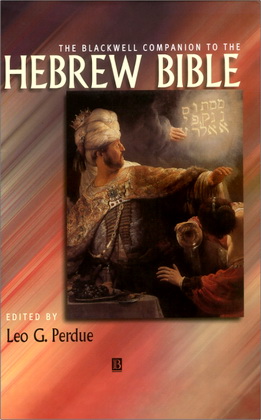
The Blackwell Companion to the Hebrew Bible
Edited by Leo G. Perdue, 2001
Preface: The Hebrew Bible in Current Research
- Part I. The Hebrew Bible in Modern Study
1. Preparatory Issues in Approaching Biblical Texts. Antony F. Campbell, SJ - 2. Methods of Modern Literary Criticism. David Jobling - 3. Social Scientific Approaches. Charles E. Carter
- Part II. Israelite and Early Jewish History
4. Early Israel and the Rise of the Israelite Monarchy. Carol Meyers - 5. The History of Israel in the Monarchic Period. Leslie J. Hoppe - 6. Exile, Restoration, and Colony: Judah in the Persian Empire. Robert P. Carroll
- Part III. Archaeology of Ancient Israel and Early Judaism
7. Archaeology and the History of Israel. William G. Dever - 8. Biblical and Syro-Palestinian Archaeology. William G. Dever
- Part IV. The Religious and Social World of Ancient Israel and Early Judaism
9. Canaan. Dennis Pardee - 10. The Household in Ancient Israel and Early Judaism. Joseph Blenkinsopp - 11. Archaeology, the Israelite Monarchy, and the Solomonic Temple. William G. Dever - 12. Schools and Literacy in Ancient Israel and Early Judaism. André Lemaire
- Part V. Old Testament Theology
13. Modern Approaches to Old Testament Theology. Henning Graf Reventlow - 14. Symmetry and Extremity in the Images of yhwh. Walter Brueggemann - 15. Theological Anthropology in the Hebrew Bible. Phyllis A. Bird - 16. The Community of God in the Hebrew Bible. R. E. Clements - 17. Old Testament Ethics. Bruce C. Birch
- Part VI. The Torah
18. Creation and Redemption in the Torah. Rolf Rendtorff - 19. Law and Narrative in the Pentateuch. Calum Carmichael
- Part VII. The Prophets
20. Former Prophets: The Deuteronomistic History. Hermann Spieckermann - 21. Latter Prophets: The Major Prophets. Klaus Koch - 22. Latter Prophets: The Minor Prophets. James L. Crenshaw
- Part VIII. The Writings
23. Narrative Texts: Chronicles, Ezra, and Nehemiah. Ralph W. Klein - 24. The Psalter. Erhard S. Gerstenberger - 25. Wisdom Literature. Katharine J. Dell - 26. Apocalyptic Literature. John J. Collins
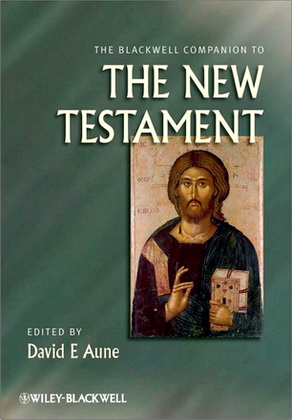
The Blackwell Companion to the New Testament
Edited by David E. Aune, 2010
Introduction. David E. Aune - 1. The World of Roman Hellenism. David E. Aune - 2. The World of Early Judaism. Judith H. Newman - 3. The Archaeological Setting. C. Thomas McCollough - 4. New Testament Greek. Christophe Rico - 5. Reconstructing the Text of the New Testament. Michael W. Holmes - 6. The Canons of the New Testament. Leslie Baynes - 7. Historical Criticism. David E. Aune - 8. Literary Criticism. David E. Aune - 9. Form Criticism. David E. Aune - 10. Feminist Criticism. Amy-Jill Levine - 11. Rhetorical Criticism. Duane F. Watson - 12. Social-Scientifi c Criticism. Jerome H. Neyrey, SJ - 13. Socio-Rhetorical Interpretation. Vernon K. Robbins - 14. The Problem of the Historical Jesus. Dale C. Allison, Jr. - 15. The Synoptic Problem. Patricia Walters - 16. Q: The Sayings Source. Ronald A. Piper - 17. The Gospel of Mark. Jens Schröter - 18. The Gospel of Matthew. Dennis C. Duling - 19. Luke–Acts: The Gospel of Luke and the Acts of the Apostles. Richard P. Thompson - 20. Johannine Literature: The Gospel and Letters of John. John Painter - 21. Paul and his Letters. Jouette M. Bassler - 22. Paul’s Letter to the Romans. Thomas H. Tobin, SJ - 23. 1 Corinthians. John Fotopoulos - 24. 2 Corinthians. Calvin J. Roetzel - 25. Galatians. Mark D. Nanos - 26. Philippians. Paul Hartog - 27. Colossians. Troy W. Martin and Todd D. Still - 28. 1 Thessalonians. Karl P. Donfried - 29. 2 Thessalonians. Edgar Krentz - 30. Paul’s Letter to Philemon. John R. Levison - 31. Ephesians. Margaret Y. MacDonald - 32. The Pastoral Letters: 1 and 2 Timothy and Titus. David E. Aune - 33. The Letter of James. Paul A. Holloway - 34. 1 Peter. Brian Han Gregg - 35. 2 Peter and Jude. Kevin B. McCruden - 36. Hebrews. Craig R. Koester - 37. The Apocalypse of John. David L. Barr - 38. New Testament Apocrypha. Petra Heldt
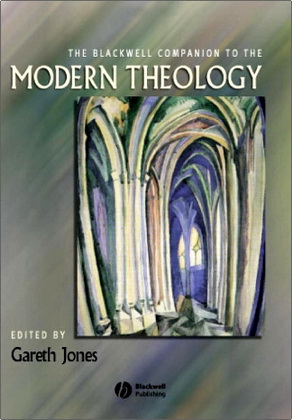
The Blackwell Companion to the Modern Theology
Edited by Gareth Jones, 2004
- Part I. Theology and . . .
1. The Practice of Faith. Robin Gill - 2. Biblical Studies. John Barton - 3. Philosophy. David B. Burrell - 4. Culture. Charles T. Mathewes - 5. Social Theory. Don Browning - 6. Theological Anthropology. Ray Anderson - 7. History. William Dean
- Part II. History
8. Patristics. G. R. Evans and Morwenna Ludlow - 9. Medieval Theology. Stephen F. Brown - 10. Reformation. Carl R. Trueman - 11. Modernity. Garrett Green
- Part III. Themes
12. Trinity. Bruce D. Marshall - 13. Incarnation. John Webster - 14. Redemption Esther D. Reed - 15. Eschatology. Andrew Chester - 16. Church and Sacraments. Gavin D’Costa
- Part IV. Key Modern Figures
17. Kant. Gareth Jones - 18. Hegel. Merold Westphal - 19. Schleiermacher. Dawn DeVries - 20. Barth. Mark Lindsay - 21. Rahner. Karen Kilby - 22. Bonhoeffer. John W. de Gruchy - 23. Bultmann and Tillich. James M. Byrne - 24. Von Balthasar. Mark McIntosh
- Part V. Contemporary Issues
25. Christianity and Other Religions. Ian Markham - 26. Economics and Social Justice. Martyn Percy - 27. Feminism. Patricia Daniel - 28. Rediscovery of Mysticism. Ralph Norman - 29. The Context of Eco-theology. Laurel Kearns - 30. Drama, Film and Postmodernity. Richard Arrandale - 31. Race. M. Shawn Copeland - 32. Science. Robert John Russell and Kirk Wegter-McNelly
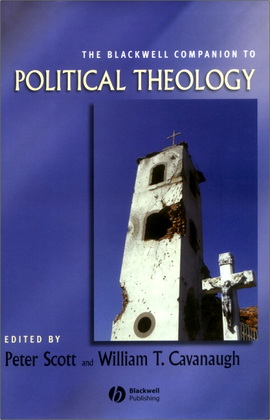
The Blackwell Companion to Political Theology
Edited by Peter Scott and William T. Cavanaugh, 2004
Introduction. William T. Cavanaugh and Peter Scott
- Part I. Traditioned Resources: Scripture, Traditions, Liturgy
1. Scripture: Old Testament. Walter Brueggemann - 2. Scripture: New Testament. Christopher Rowland - 3. Augustine. Jean Bethke Elshtain - 4. Aquinas. Frederick Christian Bauerschmidt - 5. The Reformation. Andrew Bradstock - 6. Liturgy. Bernd Wannenwetsch - Part II. Political Theologies: Survey - 7. Eastern Orthodox Thought. Michael Plekon - 8. Carl Schmitt. Michael Hollerich - 9 Karl Barth. Haddon Willmer - 10. Dietrich Bonhoeffer. Stanley Hauerwas - 11. John Courtney Murray. Michael J. Baxter - 12. William Temple. Alan M. Suggate - 13. Reinhold Niebuhr. William Werpehowski - 14. Feminist Theology, Southern. Kwok Pui-lan - 15. Feminist Theology, Northern. Elaine Graham - 16. Jürgen Moltmann. Nicholas Adams - 17. Johann Baptist Metz. J. Matthew Ashley - 18. Political Theologies in Asia. Aloysius Pieris - 19. Black Political Theologies. M. Shawn Copeland - 20. Gustavo Gutiérrez. Roberto S. Goizueta - 21. Stanley Hauerwas. R. R. Reno
- Part III. Constructive Political Theology
22. Trinity. Kathryn Tanner - 23. Creation. Peter Scott - 24. Christology. Raymund Schwager - 25. Atonement. Timothy J. Gorringe - 26. Spirit. Mark Lewis Taylor - 27. Church. William T. Cavanaugh - 28. Eschatology. Robert W. Jenson
- Part IV. Structures and Movements
29. State and Civil Society. Daniel M. Bell, Jr. - 30. Democracy. John W. de Gruchy - 31. Critical Theory. Marsha Aileen Hewitt - 32. Postmodernism. Catherine Pickstock - 33. Globalization. Peter Sedgwick
- Part V. Perspectives
34. The Islamic Quest for Sociopolitical Justice. Bustami Mohamed Khir - 35. Abrahamic Theo-politics: A Jewish View. Peter Ochs
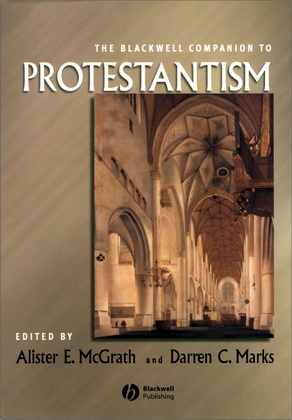
The Blackwell Companion to Protestantism
Edited by Alister E. McGrath and Darren C. Marks, 2004
Foreword. Alister E. McGrath and Darren C. Marks - Introduction: Protestantism – the Problem of Identity. Alister E. McGrath and Darren C. Marks
- Part I The Formation of Protestant Identity: History and Ideology
European Protestantism - 1. Protestantism in German-speaking Lands to the Present Day. Randall C. Zachman - 2. Shapers of Protestantism: Martin Luther. Graham Tomlin - 3. Shapers of Protestantism: John Calvin. Alister E. McGrath - 4. Shapers of Protestantism: F. D. E. Schleiermacher. Nicholas Adams - 5. Shapers of Protestantism: Karl Barth. John Webster - 6. English Protestantism to the Present Day. Gerald Bray - 7. Scottish Protestantism to the Present Day. Kenneth B. E. Roxburgh - 8. Welsh Protestantism to the Present Day. D. Densil Morgan - 9. Irish Protestantism to the Present Day. Alan Ford - 10. Nordic Protestantism to the Present Day. Aasulv Lande - 11. Protestantism in the Netherlands to the Present Day. Peter van Rooden - 12. Protestantism in Eastern Europe to the Present Day. Parush Parushev and Toivo Pilli - 13. French Protestantism to the Present Day. Alister E. McGrath - 14. Italian Protestantism to the Present Day. Alister E. McGrath - North American Protestantism - 15. Protestantism in the United States of America to the Present Day. John Corrigan - 16. Shapers of Protestantism: Jonathan Edwards. Stephen R. Holmes - 17. Canadian Protestantism to the Present Day. Darren C. Marks - Asia and Australasia - 18. Indian Protestantism to the Present Day. Ivan Morris Satyavrata - 19. South-East Asian Protestantism to the Present Day. Yung Hwa - 20. Japanese Protestantism to the Present Day. Nozomo Miyahira - 21. Korean Protestantism to the Present Day. Young-Gi Hong - 22. Chinese Protestantism to the Present Day. Carver T. Yu - 23. Protestantism in Australia, New Zealand and Oceania to the Present Day. Ian Breward - Africa - 24. African Protestantism to the Present Day. John S. Pobee
- Part II. Protestantism and Present Identity: Relations and Influence
Protestantism and its Relations - 25. Protestantism and the Bible. R. Kendall Soulen - 26. Protestantism and the Arts. Trevor Hart - 27. Protestantism and Politics, Economics, and Sociology. J. Philip Wogaman - 28. Protestantism, Law and Legal Thought. John Witte Jr. - 29. Protestantism and the Sciences. Ted Peters - Protestantism and its Influence - 30. Protestantism and Liberalism. Mark D. Chapman - 31. Protestantism and Feminism. Cynthia L. Rigby - 32. Protestantism and Fundamentalism. William V. Trollinger Jr. - 33. Protestantism and Racism. Paul R. Griffin - 34. Protestantism and Judaism. Clark M. Williamson - 35. Protestantism and Spirituality. Bradley P. Holt - 36. Protestantism and Missions. Werner Ustorf
- Part III. The Future of Protestantism
37. The Future of Protestantism: Ecumenism and the Mainline Denominations. Alan D. Falconer - 38. The Future of Protestantism: Evangelicalism. Mark A. Noll - 39. The Future of Protestantism: The Rise of Pentecostalism. Allan Anderson - 40. The Future of Protestantism: Postmodernity. Graham Ward - 41. The Future of Protestantism: The Non-Western Protestant World. Allan Anderson
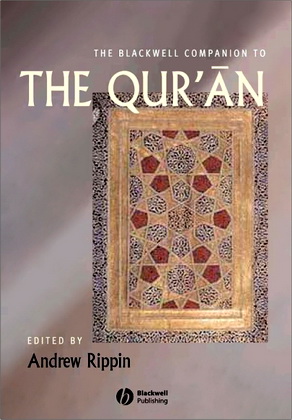
The Blackwell Companion to the Quran
Edited by Andrew Rippin, 2006
Preface. Andrew Rippin
- Part I. Orientation
1. Introducing. Tamara Sonn - 2. Discovering. Christopher Buck - 3. Contextualizing. Abdullah Saeed
- Part II. Text
4. Linguistic Structure. Salwa M. S. El-Awa - 5. Patterns of Address. Rosalind Ward Gwynne - 6. Language. Mustansir Mir - 7. Poetry and Language. Navid Kermani - 8. Foreign Vocabulary. Michael Carter - 9. Structure and the Emergence of Community. Angelika Neuwirth - 10. Sacrality and Collection. Aliza Shnizer - 11. Written Transmission. François Déroche - 12. Context: Muhammad. Herbert Berg - 13. Context: Umar bal-Khattab. Avraham Hakim
- Part III. Content
14. God. Andrew Rippin - 15. Prophets and Prophethood. Uri Rubin - 16. Moses. Brannon Wheeler - 17. Argumentation. Kate Zebiri - 18. Knowing and Thinking. A. H. Mathias Zahniser - 19. Sex, Sexuality, and the Family. Khaleel Mohammed - 20. Jihad. Reuven Firestone
- Part IV. Interpretation
21. Hermeneutics: al-Thalabý. Walid Saleh - 22. Stories of the Prophets. Marianna Klar - 23. Sufism. Alan Godlas - 24. Rumý. Jawid Mojaddedi - 25. Twelver Shi’i Ta’wil. Diana Steigerwald - 26. Ismaiılı Tawıl. Diana Steigerwald
- Part V. Application
27. Exegetical Sciences. Jane Dammen McAuliffe - 28. Theology. Binyamin Abrahamov - 29. Jurisprudence. A. Kevin Reinhart - 30. Contemporary Ethical Issues. Leah Kinberg - 31. Narrative Literature. Roberto Tottoli - 32. Recitation. Anna M. Gade
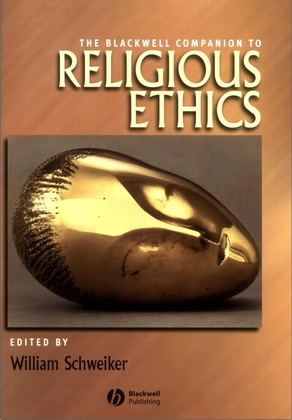
The Blackwell Companion to Religious Ethics
Edited by William Schweiker, 2005
On Religious Ethics. William Schweiker
- Part I. Moral Inquiry
1. Reflection - 1. Moral Theories. Robin W. Lovin - 2. Moral Truth. Maria Antonaccio - 3. Agents and Moral Formation. Thomas W. Ogletree - 4. Ideas of Ethical Excellence. Lee Yearley - 5. Practical Reasoning and Moral Casuistry. Albert R. Jonsen - 6. Authority and Religious Experience. Darrell J. Fasching - 2. Transmission - 7. Text and Canon. Michael Fishbane - 8. Practices. Francis X. Clooney - 9. Ritual. Francisca Cho - 10. Saints and Exemplars. Lamin Sanneh - 11. Law and Religion. Winnifred Fallers Sullivan - 3. Comparison - 12. Norms, Values, and Metaphysics. Franklin I. Gamwell - 13. Cosmology. Frank E. Reynolds and Jonathan W. Schofer - 14. Culture and Moral Pluralism. Bruce Grelle - 15. History of Religions. Donald K. Swearer - 16. Comparison in Religious Ethics. Sumner B. Twiss
- Part II. Moral Traditions
1. Jewish Ethics - 17. Jewish Ethics? Hilary Putnam - 18. Foundations of Jewish Ethics. Ronald M. Green - 19. Ethics Differentiated from the Law. Shaul Magid - 20. From Law to Ethics . . . and Back. Nancy Levene - 2. Christian Ethics - 21. Christian Ethics? Gene Outka - 22. Origins of Christian Ethics. Jef Van Gerwen - 23. Differentiation in Christian Ethics. Vigen Guroian - 24. Trajectories in Christian Ethics. Jean Porter - 3. Islamic Ethics - 25. Muslim Ethics? Ebrahim Moosa - 26. Origins of Islamic Ethics: Foundations and Constructions. A. Kevin Reinhart - 27. Islamic Ethics: Differentiations. Abdulaziz Sachedina - 28. Muslim Ethical Trajectories in the Contemporary Period. Frederick Mathewson Denny - 4. Buddhist Ethics - 29. Buddhist Ethics? John Ross Carter - 30. Origins of Buddhist Ethics. Damien Keown - 31. Cultural Differentiation in Buddhist Ethics. Thomas P. Kasulis - 32. Buddhist Ethics: Trajectories. Charles Hallisey - 5. Indian/Hindu Ethics - 33. Hindu Ethics? Roy W. Perrett - 34. Origins of Hindu Ethics. Anne E. Monius - 35. Differentiations in Hindu Ethics. Maria Heim - 36. Trajectories of Hindu Ethics. Joseph Prabhu - 6. Chinese Ethics - 37. Chinese Ethics? Eske Møllgaard - 38. Origins of Chinese Ethics. Philip J. Ivanhoe - 39. Differentiations in Chinese Ethics. Mark Csikszentmihalyi - 40. Trajectories of Chinese Religious Ethics. Mark Berkson - 7. African Ethics - 41. African Ethics? Barry Hallen - 42. Origins of African Ethics. Segun Gbadegesin - 43. Differentiations in African Ethics. Bénézet Bujo - 44. Trajectories in African Ethics. Laura Grillo
- Part III. Moral Issues
1. Systems - 45. Economics. Max L. Stackhouse - 46. Technology. Gerald P. McKenny - 47. Ecology. William French - 48. Nations. Jean Bethke Elshtain - 49. Global Dynamics. Sallie B. King - 50. Religious Membership. Robin Gill - 2. Persons - 51. Human Rights. Simeon O. Ilesanmi - 52. Future Generations. Svend Andersen - 53. Health. Katherine K. Young - 54. Body Culture. Regina Mmicht-Quinn - 55. Religion and Religious War. John Kelsay - 56. Moral Development. Don S. Browning - 57. Indigenous Peoples. Vine Deloria, Jr.
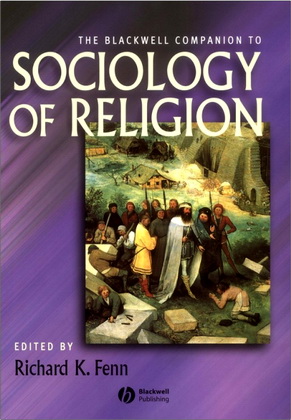
The Blackwell Companion to Sociology of Religion
Edited by Richard K. Fenn, 2003
- Part I. Classical and Contemporary Theory: Recycling, Continuity, Progress, or New Departures?
Editorial Commentary: Religion and the Secular; the Sacred and the Profane: The Scope of the Argument - 1. Personal Reflections in the Mirror of Halévy and Weber. David Martin - 2. Salvation, Secularization, and De-moralization. Bryan Wilson - 3. The Pentecostal Gender Paradox: A Cautionary Tale for the Sociology of Religion. Bernice Martin - 4. Feminism and the Sociology of Religion: From Gender-blindness to Gendered Difference. Linda Woodhead - 5. Melancholia, Utopia, and the Psychoanalysis of Dreams. Donald Capps - 6. Georg Simmel: American Sociology Chooses the Stone the Builders Refused. Victoria Lee Erickson - 7. Transformations of Society and the Sacred in Durkheim’s Religious Sociology. Donald A. Nielsen - 8. Classics in the Sociology of Religion: An Ambiguous Legacy. Roger O’Toole - 9. Individualism, the Validation of Faith, and the Social Nature of Religion in Modernity. Danièle Hervieu-Léger - 10. The Origins of Religion. Richard K. Fenn
- Part II. Contemporary Trends in the Relation of Religion to Society
Editorial Commentary: Whose Problem is it? The Question of Prediction versus Projection - 11. Secularization Extended: From Religious “Myth” to Cultural Commonplace. Nicholas J. Demerath III - 12. Social Movements as Free-floating Religious Phenomena. James A. Beckford - 13. The Social Process of Secularization. Steve Bruce - 14. Patterns of Religion in Western Europe: An Exceptional Case. Grace Davie - 15. The Future of Religious Participation and Belief in Britain and Beyond. Robin Gill - 16. Religion as Diffusion of Values. “Diffused Religion” in the Context of a Dominant Religious Institution: The Italian Case. Roberto Cipriani - 17. Spirituality and Spiritual Practice. Robert Wuthnow - 18. The Renaissance of Community Economic Development among African-American Churches in the 1990s. Katherine Day - 19. Hell as a Residual Category: Possibilities Excluded from the Social System. Richard K. Fenn and Marianne Delaporte
- Part III. The Sociology of Religion and Related Areas of Inquiry
Editorial Commentary: Looking for the Boundaries of the Field: Social Anthropology, Theology, and Ethnography - 20. Acting Ritually: Evidence from the Social Life of Chinese Rites. Catherine Bell - 21. Moralizing Sermons, Then and Now. Thomas Luckmann - 22. Health, Morality and Sacrifice: The Sociology of Disasters. Douglas J. Davies - 23. Contemporary Social Theory as it Applies to the Understanding of Religion in Cross-cultural Perspective. Peter Beyer - 24. The Return of Theology: Sociology’s Distant Relative. Kieran Flanagan - 25. Epilogue: Toward a Secular View of the Individual. Richard K. Fenn
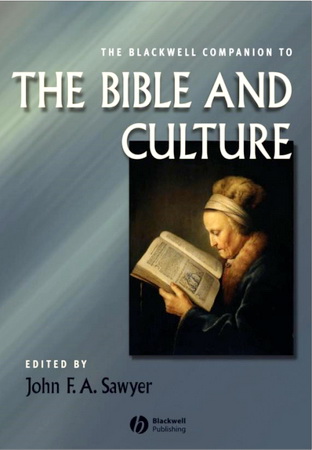
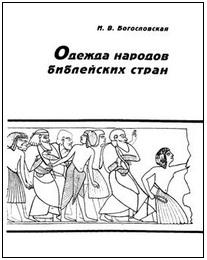
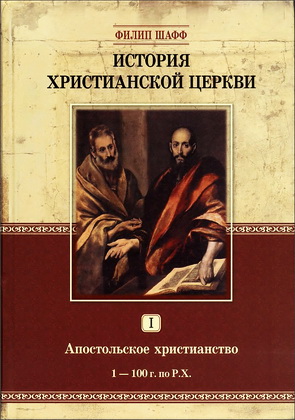
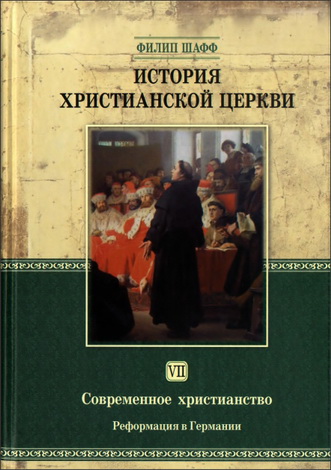
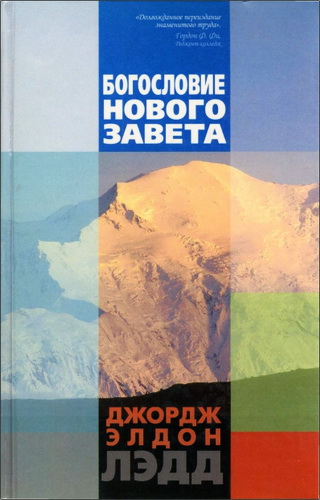
Комментарии (1 комментарий)
Спасибо! Еще одна мощная подборка справочников по библеистике, богословию и религиоведению для студентов и преподавателей!